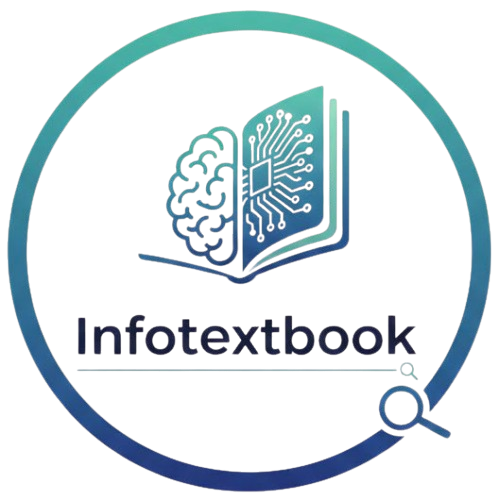Table of Contents
ToggleDonald Trump Life, Career, and Political Journey Explained

Introduction to Donald Trump
Donald Trump is one of the most prominent figures in American politics and business. Known for his bold personality, media presence, and distinctive leadership style, he has influenced both the political and business landscapes of the United States. From his real estate empire to his presidency, Donald Trump continues to capture global attention.
Early Life and Education
Born on June 14, 1946, in Queens, New York, Donald Trump was raised in a family deeply involved in real estate. He attended the Wharton School of the University of Pennsylvania, where he developed a strong foundation in economics and business management. Early exposure to his family’s business shaped his entrepreneurial mindset and competitive spirit.
Business Career
Before entering politics, Donald Trump built a highly successful career in real estate and entertainment. He expanded his father’s real estate business, acquiring hotels, casinos, and commercial properties worldwide. His brand became synonymous with luxury, with ventures such as Trump Tower and Trump Hotels. Beyond real estate, he gained fame through television, notably as the host of The Apprentice, showcasing his business acumen and assertive persona.
Entry into Politics
Trump officially entered the political arena in 2015, announcing his candidacy for the U.S. presidency. His campaign emphasized economic nationalism, immigration reform, and “America First” policies. Despite being a political outsider, he successfully leveraged media and public appearances to connect with voters, ultimately winning the 2016 presidential election.
Presidency Highlights
During his term from 2017 to 2021, Donald Trump implemented significant policies impacting trade, taxation, and foreign relations. He focused on deregulation, tax reform, and renegotiating trade deals. His approach to governance, often direct and unconventional, resonated with a large segment of Americans while sparking debate and discussion nationwide.
Post Presidency Activities
After leaving office, Donald Trump remained active in political discourse, influencing the Republican Party and endorsing candidates. He continues to engage with the public through media appearances, rallies, and social platforms, maintaining a strong political presence.
Controversies and Public Image
Donald Trump’s career has been marked by numerous controversies, ranging from political decisions to personal behavior. While critics often challenge his methods and statements, his supporters praise his bold leadership style and commitment to policies they believe benefit the nation. This duality in perception keeps him a highly influential and discussed figure globally.
Legacy and Impact
The legacy of Donald Trump is complex, blending business success, political influence, and public fascination. His approach reshaped political campaigns, emphasizing direct communication and media engagement. As both a businessman and politician, his impact continues to influence future generations and the political landscape of the United States.
Introduction to Donald Trump
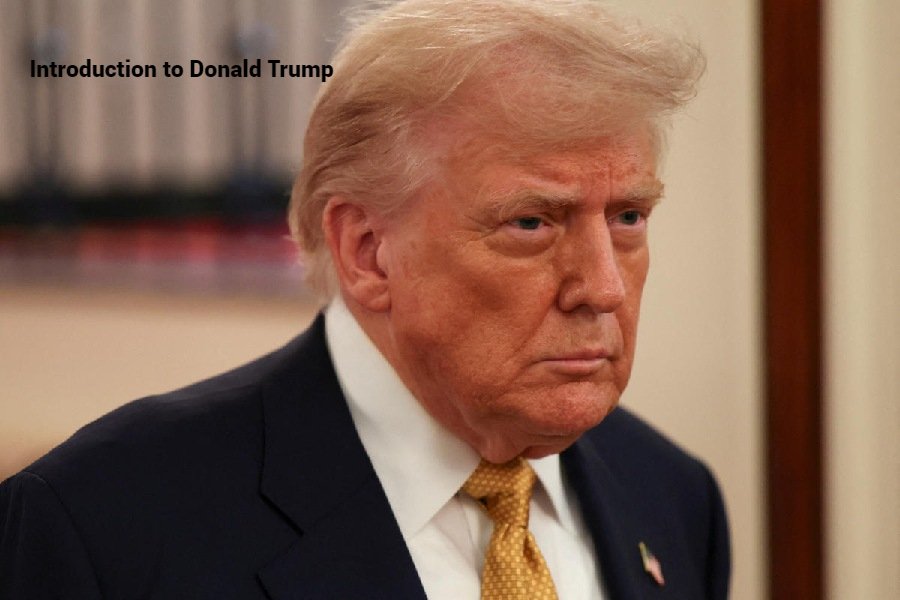
Introduction to Donald Trump
Donald Trump is one of the most recognizable and polarizing figures in modern American history, known for his influential role in both business and politics. Born on June 14, 1946, in Queens, New York, Donald Trump grew up in a family deeply involved in real estate. His father, Fred Trump, was a successful real estate developer, and this early exposure to the business world significantly shaped Donald Trump’s ambitions and work ethic. From a young age, he demonstrated a keen interest in entrepreneurship and deal making, traits that would define his career.
After completing his early education, Donald Trump attended the Wharton School of the University of Pennsylvania, one of the most prestigious business schools in the country. There, he honed his knowledge of finance, economics, and management, laying the groundwork for his future endeavors. His education, combined with practical experience in his family’s real estate ventures, gave him a unique perspective on the business world.
In his professional career, Donald Trump became widely known for transforming and expanding the family business into a global brand. He acquired iconic properties, including Trump Tower in New York City, luxury hotels, and casinos, establishing a reputation for high-profile, often controversial deals. Beyond real estate, Trump gained mass public attention through television, particularly as the host of The Apprentice, where his decisive personality and business insights were prominently showcased.
However, it was his entry into politics that truly elevated Donald Trump to international prominence. Announcing his candidacy for the U.S. presidency in 2015, he positioned himself as an outsider challenging the political establishment. His campaign emphasized economic nationalism, immigration reform, and the “America First” agenda, resonating with millions of voters. The successful 2016 election victory marked a dramatic shift in American politics, making Donald Trump the 45th President of the United States.
From business mogul to television personality to political leader, Donald Trump has consistently been a figure of public fascination. His unique style, bold decisions, and controversial approach have made him a central figure in global discussions about leadership, media influence, and political strategy. Understanding the life and career of Donald Trump provides insight into the intersections of business, politics, and popular culture in the 21st century
Early Life and Education
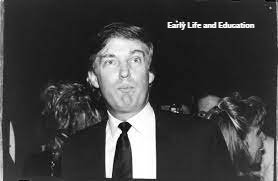
Early Life and Education
Donald Trump was born on June 14, 1946, in Queens, New York City, into a well-established family with deep roots in real estate. His father, Fred Trump, was a successful real estate developer who specialized in residential housing for middle-class families in New York. Growing up in this environment, Donald Trump was exposed to the world of business and entrepreneurship from a young age. He often accompanied his father on property visits and observed firsthand how real estate deals and construction projects were managed. This early exposure played a critical role in shaping his ambition and business mindset.
As a child, Donald Trump was known for his competitive spirit and outgoing personality. He attended the Kew-Forest School but was later sent to the New York Military Academy at age 13 due to behavioral challenges. The disciplined environment of the military academy helped him develop leadership qualities, resilience, and a strong work ethic. He excelled academically and in sports, learning the value of structure and determination—traits that would serve him well in both his business ventures and political career.
After completing high school, Donald Trump enrolled in Fordham University in 1964. He spent two years there before transferring to the Wharton School of the University of Pennsylvania, one of the nation’s leading business schools. At Wharton, he majored in economics, focusing on real estate and finance. The rigorous academic program provided him with a strong foundation in business principles, investment strategies, and financial management. During his college years, Donald Trump also began developing a vision for expanding his family’s real estate empire, demonstrating early signs of his entrepreneurial ambition and strategic thinking.
The combination of his family background, military school discipline, and elite business education shaped Donald Trump into a confident and ambitious individual. These formative years laid the groundwork for his later achievements in real estate, entertainment, and eventually politics. Understanding the early life and education of Donald Trump provides valuable insight into the experiences and influences that helped mold one of the most recognizable business and political figures in modern history
Business Career
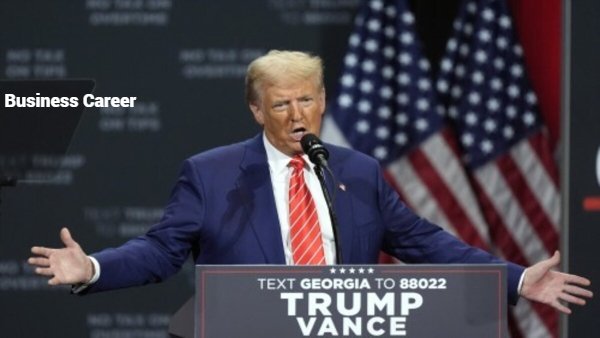
Business Career of Donald Trump
Before venturing into politics, Donald Trump had already established himself as a prominent figure in the business world. Born into a family with a strong background in real estate, he inherited not just wealth but also a keen understanding of property development and entrepreneurship. Early on, Trump displayed an aptitude for business, quickly learning the intricacies of the industry under the guidance of his father, Fred Trump, who ran a successful real estate company in New York City.
Donald Trump expanded the family business into new heights, transforming it from a regional real estate company into an international brand. He became synonymous with luxury properties, skyscrapers, and hotels. Trump Tower in Manhattan remains one of his most iconic projects, symbolizing his approach to high-profile real estate ventures. Over the years, he diversified his portfolio, including residential buildings, commercial spaces, casinos, golf courses, and hotels, both in the U.S. and abroad.
In addition to real estate, Donald Trump ventured into branding and entertainment. His name itself became a global brand, associated with opulence and success. Beyond buildings, he licensed the Trump name for various ventures, including residential complexes, merchandise, and resorts. This branding strategy significantly contributed to his wealth and global recognition.
Another milestone in Trump’s business career was his involvement in the entertainment industry. Hosting the popular television show The Apprentice allowed Donald Trump to showcase his persona as a decisive and assertive businessman. The show not only enhanced his public image but also reinforced his reputation for negotiating, leadership, and business strategy.
Despite his successes, Trump’s business career faced challenges, including financial difficulties with some casino projects and other ventures. However, his ability to rebound and maintain a high-profile brand demonstrates resilience and strategic thinking. These experiences in handling both successes and setbacks have shaped his approach to business and leadership.
Overall, the business career of Donald Trump reflects ambition, risk-taking, and a knack for turning ventures into widely recognized brands. His journey in real estate, entertainment, and branding laid the foundation for his later ventures into politics, giving him the confidence, public presence, and strategic mindset that would define his leadership style.
Entry into Politics
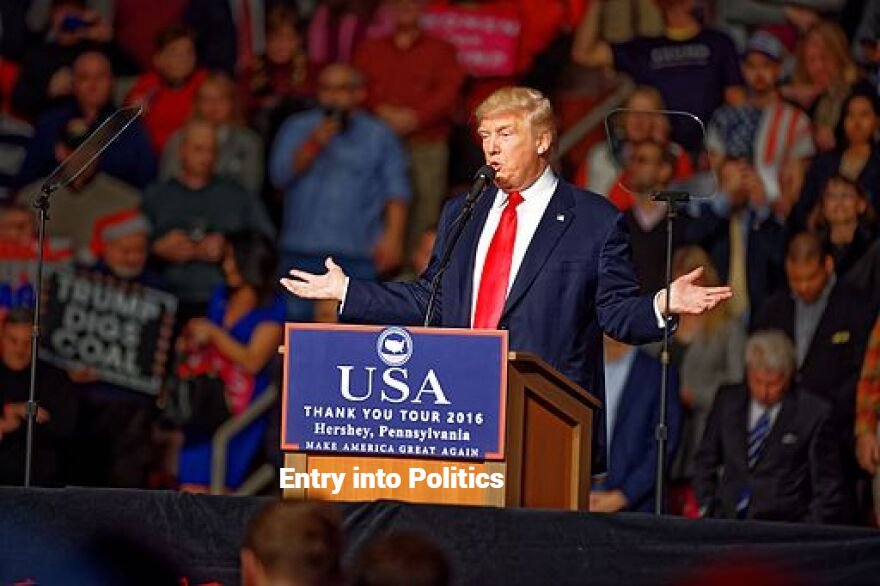
Entry into Politics
The entry of Donald Trump into politics was a significant shift from his long-established career in real estate and entertainment. Though widely known as a businessman and television personality, Trump had long expressed interest in political issues, often commenting on economic policies, trade, and international relations. His official political journey began in 2015, when he announced his candidacy for the presidency of the United States, surprising both political analysts and the general public.
During his campaign, Donald Trump positioned himself as a political outsider who could challenge the established norms of Washington. He emphasized an “America First” agenda, focusing on economic nationalism, immigration reform, and policies aimed at revitalizing domestic industries. His ability to connect with ordinary citizens, coupled with his mastery of media coverage, allowed him to stand out among a crowded field of candidates.
Trump’s campaign was characterized by direct communication and unfiltered commentary. Unlike traditional politicians, Donald Trump used social media platforms extensively to engage with voters, announce policies, and respond to criticism in real time. This approach helped him bypass traditional media channels and speak directly to the electorate, creating a unique political brand that resonated with millions.
His entry into politics also brought attention to controversial topics, such as trade deficits, border security, and the renegotiation of international agreements. Supporters viewed him as a leader willing to prioritize the interests of the American people, while critics expressed concerns over his unconventional style and rhetoric. Regardless of differing opinions, Donald Trump’s emergence transformed the landscape of political campaigning, demonstrating the power of personal branding and media influence in modern elections.
By the time of the 2016 Republican primaries, Trump’s outsider persona, combined with his emphasis on populist themes, allowed him to gain significant traction among voters. His political entry, while polarizing, ultimately led to his victory in the 2016 presidential election, marking one of the most notable transitions from business mogul to elected official in U.S. history
Presidency Highlights
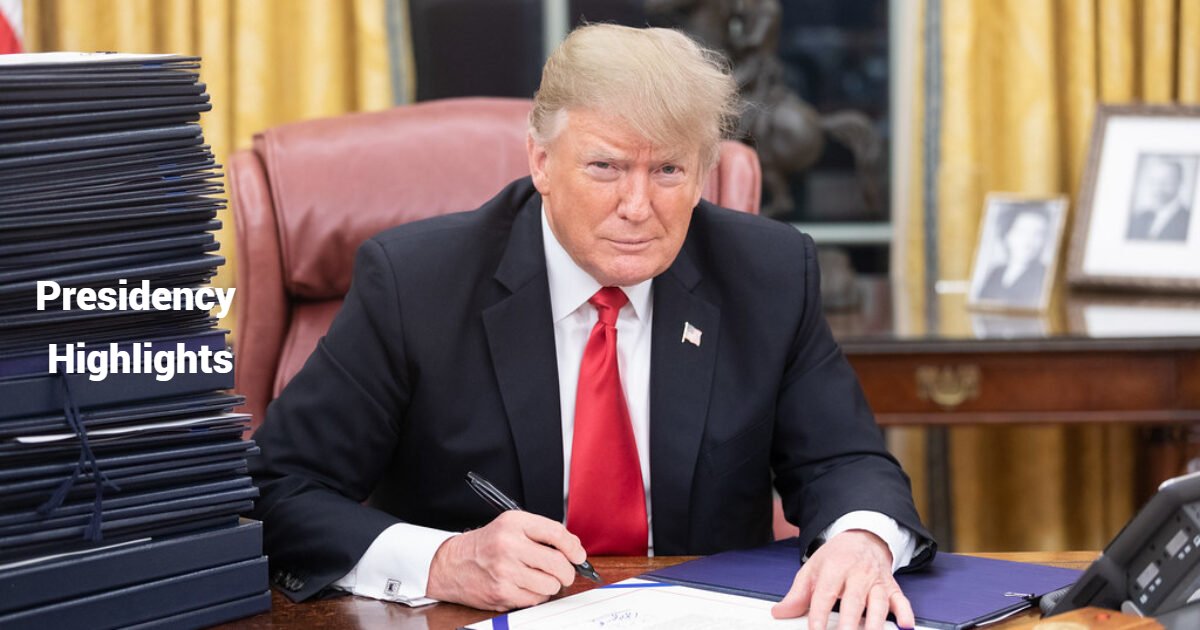
Presidency Highlights
Donald Trump assumed office as the 45th President of the United States on January 20, 2017, bringing an unconventional and highly visible leadership style to the White House. His presidency was characterized by a focus on economic growth, deregulation, immigration reform, and a foreign policy strategy often summarized as “America First.”
One of the major achievements of Donald Trump’s tenure was the enactment of the Tax Cuts and Jobs Act of 2017, which aimed to reduce corporate tax rates and provide tax relief for individuals. This move was intended to stimulate business investment, encourage job creation, and boost economic growth. Alongside tax reform, Donald Trump emphasized deregulation across multiple sectors, reducing federal regulations to ease the business environment and promote entrepreneurship.
In foreign policy, Donald Trump adopted a more assertive and transactional approach. He renegotiated trade agreements, such as the United States-Mexico-Canada Agreement (USMCA), to replace NAFTA, seeking better terms for American workers and businesses. Additionally, he focused on confronting global challenges, including trade imbalances with China and addressing international security threats, while reshaping the U.S. role in global organizations and alliances.
Immigration policy also formed a central pillar of Donald Trump’s presidency. Initiatives like enhanced border security, travel restrictions for certain countries, and reforms in legal immigration aimed to prioritize national security and economic interests. These policies were highly debated, reflecting both strong support and significant opposition within the country.
Domestic achievements included efforts to support veterans, streamline healthcare administration, and promote energy independence through increased domestic production of oil and natural gas. Donald Trump’s administration also emphasized judicial appointments, successfully confirming numerous federal judges and three Supreme Court justices, shaping the judiciary for decades to come.
While controversial at times, Donald Trump’s presidency left a lasting impact on U.S. politics and governance. His leadership style, decision-making approach, and policy priorities continue to influence political discourse and party strategies. For supporters, he represented a bold, decisive approach to governance; for critics, his methods sparked intense debate and discussion. Regardless of perspective, the presidency of Donald Trump remains a significant chapter in modern American history
Controversies and Public Image
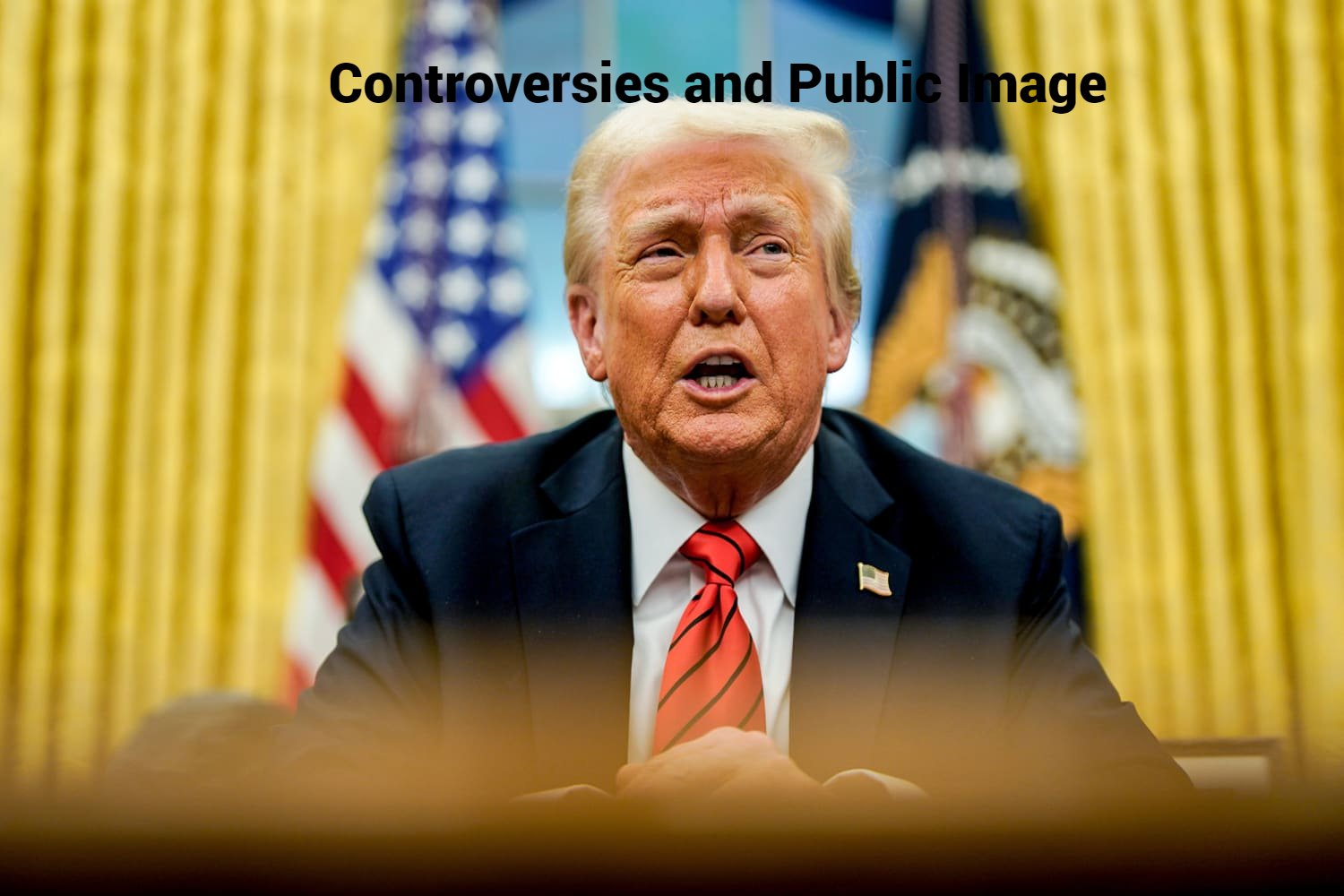
Controversies and Public Image
Donald Trump has always been a polarizing figure in both business and politics, attracting intense attention from supporters and critics alike. His career, spanning decades in real estate, television, and politics, has been marked by a series of controversies that have shaped his public image and influenced public discourse globally.
One of the most significant controversies surrounding Donald Trump relates to his political style and statements. During his presidency, he often used social media platforms, particularly Twitter, to communicate directly with the public. While this approach allowed him to connect with supporters, it also sparked widespread criticism for controversial remarks, aggressive rhetoric, and unconventional communication methods. These actions frequently dominated headlines and became focal points for debate.
In addition, Donald Trump faced legal and ethical controversies, including questions about business dealings, tax records, and conflicts of interest. Critics argued that certain business practices and policies during his presidency could present ethical concerns, while supporters emphasized his entrepreneurial success and ability to bring business perspectives into governance.
His handling of national and international issues also contributed to a complex public image. Decisions regarding immigration, trade policies, and foreign relations were lauded by some as bold and necessary, but criticized by others as divisive. Donald Trump’s approach to governance often challenged conventional political norms, which both energized his voter base and intensified opposition.
Despite controversies, Donald Trump maintains a strong following, largely due to his direct communication style, promise to address voter concerns, and image as an outsider willing to challenge the status quo. This duality—admiration from supporters and criticism from detractors—has solidified his role as a central figure in contemporary politics.
Furthermore, media coverage has played a crucial role in shaping perceptions of Donald Trump. Mainstream media, social media, and alternative news outlets have amplified both praise and criticism, reinforcing his controversial yet influential persona. His public image continues to evolve, reflecting the dynamic intersection of politics, media, and society.
In conclusion, Donald Trump’s controversies and public image are inseparable from his career. While debates about his actions and statements persist, they have undeniably contributed to his prominence and lasting impact on American political and social discourse
Legacy and Impact
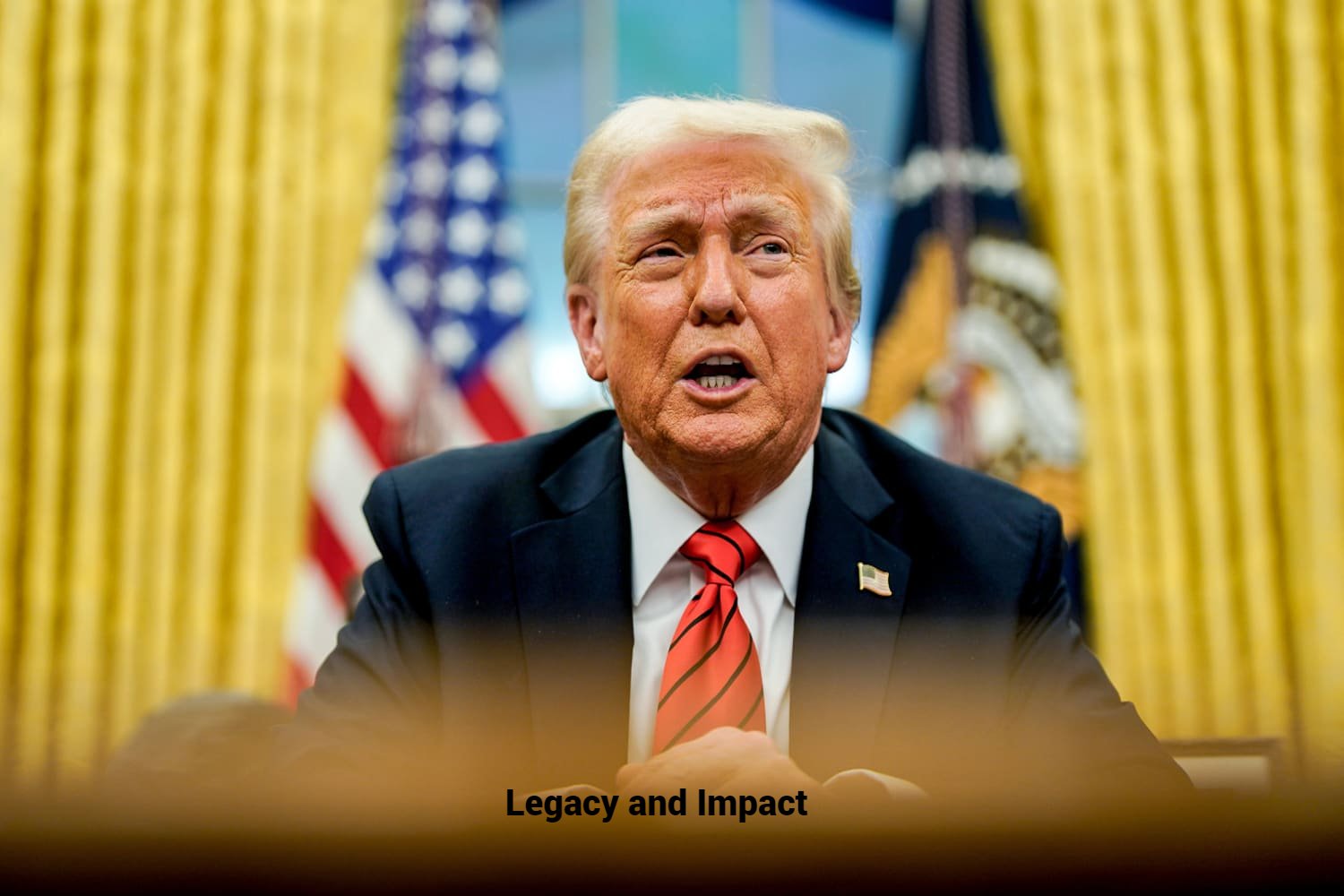
Legacy and Impact
The legacy of Donald Trump is both influential and controversial, reflecting a career that spans business, entertainment, and politics. As a businessman, he reshaped the real estate industry by building iconic properties like Trump Tower and luxury hotels worldwide. His branding strategy transformed his name into a global symbol of wealth, ambition, and luxury. Through television, most notably The Apprentice, Donald Trump also became a household name, demonstrating his ability to merge business acumen with media presence, which later played a pivotal role in his political career.
In politics, Donald Trump’s impact is undeniable. His 2016 presidential campaign introduced a new style of political communication, relying heavily on social media, direct engagement with supporters, and unfiltered messaging. This approach disrupted traditional campaigning methods and inspired a more populist style of political discourse in the United States. Policies implemented during his tenure, including tax reforms, deregulation, and trade negotiations, have had lasting effects on both the national and international economic landscape.
Donald Trump’s presidency also brought issues like immigration, healthcare, and foreign policy into sharper public debate. His approach, often unconventional and polarizing, ignited widespread discussion and increased political engagement across different demographics. Supporters praise him for prioritizing American interests, while critics highlight the controversies surrounding his decisions and rhetoric. Regardless of opinion, his influence on modern politics is evident.
Beyond policy and politics, the legacy of Donald Trump includes redefining leadership visibility in the digital age. His use of social media platforms to communicate directly with the public set a precedent for future leaders, illustrating the power of unmediated messaging.
Overall, Donald Trump’s legacy is multifaceted encompassing business innovation, political disruption, and media influence. His career demonstrates how ambition, branding, and communication can shape public perception and national discourse. Whether viewed positively or critically, Donald Trump remains a central figure whose impact will continue to be analyzed for years, influencing business, politics, and society at large
Final Thoughts

Final Thoughts
Donald Trump is a figure whose life and career exemplify ambition, resilience, and a bold approach to both business and politics. Rising from his early days in New York real estate, he expanded his family’s business into a global empire, becoming a recognizable brand in luxury properties and entertainment. His tenure as the host of The Apprentice further amplified his public profile, showcasing his leadership style and decision-making skills.
Entering politics as an outsider, Donald Trump brought a unique perspective to the U.S. presidency, emphasizing policies that resonated with a significant portion of the population. His term was marked by transformative initiatives in trade, taxation, and international relations, alongside a direct, unfiltered communication style that challenged traditional political norms.
Even after leaving office, Trump remains influential in shaping political discourse, endorsing candidates, and maintaining a strong presence in media and public life. While his career is often debated, it cannot be denied that Donald Trump has left an indelible mark on American business, politics, and culture. Understanding his journey provides a deeper insight into contemporary leadership, media influence, and the evolving dynamics of public life, making him one of the most discussed figures of the 21st century
FAQs IBPS SO Syllabus 2025
Q1. What is the IBPS SO Exam 2025?
The IBPS SO Exam 2025 is conducted by the Institute of Banking Personnel Selection to recruit Specialist Officers in various roles like IT, HR, Marketing, Law, and Agriculture.
Q2. What are the stages of the IBPS SO Exam 2025?
The exam consists of Prelims and Mains. Prelims cover reasoning, English, and quantitative aptitude/general awareness, while Mains tests professional knowledge specific to the chosen post.
Q3. Which subjects are included in the IBPS SO Prelims syllabus?
The Prelims syllabus includes Reasoning Ability, English Language, and Quantitative Aptitude/General Awareness, focusing on logical reasoning, grammar, comprehension, and banking knowledge.
Q4. What is covered in the Mains syllabus?
Mains focuses on professional knowledge relevant to the chosen role, such as IT, Law, HR, Marketing, or Agriculture, in addition to descriptive or objective questions.
Q5. How important is the IBPS SO Syllabus 2025 for preparation?
Understanding the IBPS SO Syllabus 2025 helps candidates prioritize topics, plan study schedules, and focus on high-weightage sections, improving their chances of success.
Q6. Are mock tests useful for IBPS SO 2025 preparation?
Yes, practicing previous years’ papers and mock tests helps candidates manage time, assess strengths and weaknesses, and gain confidence before the actual exam.
Q7. Where can I find the official IBPS SO Syllabus 2025?
The official syllabus is available on the IBPS official website, along with detailed exam patterns and instructions for aspirants.






